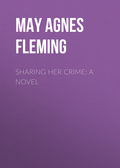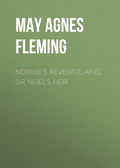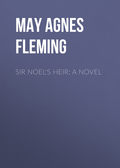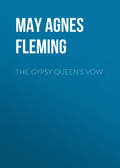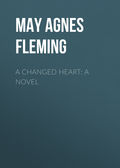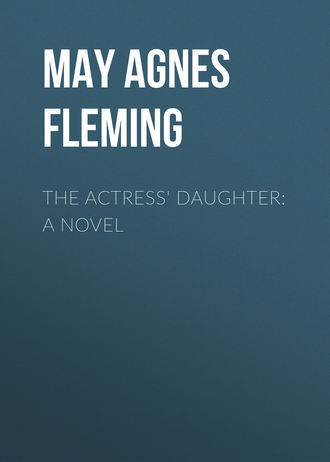
May Agnes Fleming
The Actress' Daughter: A Novel
CHAPTER VII
GEORGIA'S DREAM
"The wild sparkle of her eye seemed caught
From high, and lighted with electric thought,
And pleased not her the sports which please her age."
Two weeks passed. Charley was quite well again, and had left no effort untried to reinstate himself in the good graces of Georgia. As that young gentleman, in the profundity of his humility, had once told her he seldom failed in anything he undertook, and with his seeming genial good humor and handsome boyish face, he never found it a difficult task to make people like him, and Georgia was no more able to resist his influence than the rest of the world. And so they became good friends again – "brothers in arms" Charley said.
At first Georgia tried to resist his advances, and felt indignant at herself for allowing him to talk her into good humor and make her laugh; but it was all of no use, and at last the struggle was given up, and she condescended to patronize Master Wildair with a grave superiority that disturbed the good youth's gravity most seriously at times.
Richmond had not lost his interest in the unique child, and his influence over her increased every day. But still he was the only one who had any command over her; to the rest of the world she was the same hot, peppery, fiery little snap-dragon, defying all wills and commands that clashed with her own. And even his wishes, when very repugnant to her, she openly and fiercely braved; but, as a general thing, she began to be anxious to please her young judge, whose grave glance of stern disapproval could trouble her fearless little heart as that of no other in the world ever could. And, though she was too proud to openly let him see she cared for his approval or disapproval, still he did see it, and exulted therein.
Georgia had made her new friends acquainted with the pretty little Emily Murray, whom Charley unhesitatingly pronounced at first sight a "regular stunner," and these four soon became inseparable friends. At first Emily was shy and silent, which Charley perceiving, he also assumed a look of extreme timidity, not to say distressing bashfulness, which so imposed upon simple little Emily, that, pitying his evident embarrassment, she would timidly try to help him out by opening a conversation.
"Is it nice to live in New York?" Emily would say, hesitatingly.
"Yes'm," would be Charley's reply, in a tone of painful timidity.
"Nicer than here?"
"Yes'm – I – I think so."
"Won't your ma miss you a good deal?" Emily would insinuate, getting courage.
"No'm – I mean yes'm."
"Ain't Georgia nice?"
"Splendiferous!"
This long word being a puzzle to Emily she would have to stop a moment to reflect on its probable meaning before going on.
"So is your brother."
"Yes, but he's not near so nice as I am."
Again there would be a pause, during which Emily would look deeply shocked by this display of vanity – and then:
"It ain't nice to praise one's self," Emily would observe, seriously.
"Well, but it's true," Charley would begin, in an argumentative tone. "Now I ask yourself – don't you think I'm nicer than he is?"
Now, it was Miss Emily's private conviction that he decidedly was, she could not say no, and not wishing to commit herself by saying yes, she would look grave, and remain silent. But Charley, whose shyness generally passed away at this point, was not to be put off, and would insist:
"Now, Emily, just tell the truth, as every well-brought-up little girl should, and say, don't you like me twice as well as you do Rich?"
"Well, ye-es," Emily would reply, hesitatingly, "but I guess he knows more than you do; he looks awfully wise, anyway, and then Georgia minds him, and she don't mind you."
"That's because she isn't capable of appreciating solid wit and hidden genius – or, to use language more fitted for your uncultivated intellect, my young friend – she doesn't know on which side the bread's buttered. Any person with his senses about him would see at a glance I am worth a dozen of Richmond."
"No, you're not," would be Emily's decided answer; "you only think so yourself. I heard Uncle Edward saying your brother was wise for his age, and knew more than any young man he ever met, and he only laughed about you, and said you were a 'curled darling of nature,' whatever that means. So, then, I guess Uncle Edward knows better than you."
"Now, Miss Emily, I can't stand this; I positively can't you know. It's outrageous to expect me to lie up here and be abused in this shameful fashion, and told anybody's Uncle Edward knows more about me than I do myself. I've an immense respect for Father Murray, but still I won't permit him or anybody else to insinuate that they know more about Mr. Charles Wildair than I do. I've been acquainted with that promising youth ever since he was the size of a well-grown doughnut, and I am prepared to say, without mental reservation of any kind, that he is a perfect encyclopedia of all sorts of learning – a moving, living Webster's Dictionary, neatly bound in cloth. I've undergone grammar, declined verbs and other vicious parts of speech. I have suffered a severe course of geography, and can tell to an iota where Ireland, Kamtschatka, and lots of other aggravating places are situated; I have fought my way through French, and German, and Latin, and other dead languages; and when I go back to New York, I'm bound to have at them again, and have every single one of them, dead or alive, at my fingers ends. I have a taste for poetry and the fine arts, as I evinced in early life by a diligent perusal of that work of thrilling interest known as 'Mother Goose's Melodies', and by becoming a proficient on the Jew's-harp. I have a soul above the common, Miss Nancy, and can discover beauties in a tallow candle, and sublimity in a mug of milk and water. And now, if after this brief and inadequate exposition you don't acknowledge that my thing-um-bob-sentiments do me honor, then your intellect, like small beer in thunder, is something to be looked upon with pity and contempt!"
As Mr. Wildair, Jr., usually promulgated his sentiments to an admiring world in an exceedingly slow and leisurely manner, it took him some time to get to the end of this speech, and when he was done he found that Emily, overcome by the heat and his monotonous tone, was dropping asleep. Making a grimace, he was about to lounge back into his former lazy position, when Georgia, who had left them a moment before in full chase after a butterfly, accompanied by Richmond, returned, looking so woebegone and disconsolate that Charley, after a stare of surprise, felt called upon by the claims of common humanity to offer her consolation.
"May I ask, Miss Georgia, what awful mystery of iniquity has come to light, to make you look as if your last friend had been hung for sheep-stealing? You look about as intensely dismal now as a whole grove of weeping willows."
"Oh! it's my butterfly! my poor butterfly!" said Georgia, sorrowfully, holding up the dead insect, its bright colors all faded and gone.
"Oh, I see – as the blind man said – the insect has departed this life, leaving, no doubt, a large and bereaved circle of friends to mourn its untimely end. Funeral this evening, when friends and relatives are respectfully invited to attend – that's the newspaper style, eh? May I venture to inquire, Georgia, if the butterfly in question was a personal acquaintance of yours, that you look so afflicted at its death? Because if it was, I shall feel called upon to shed a few tears myself, out of regard for you."
"Oh, it was killed; and it was so pretty. Wasn't it pretty?" said Georgia, looking in real grief, amusing to witness, at the poor little crushed insect.
"Strangely beautiful," said Charley. "I remarked it at the time; every feature was perfect. Roman nose, intellectual forehead, well-formed head, with the bump of benevolence largely developed, blue hair, and curly teeth. And so it was killed, was it? Georgia, my friend, in the name of common humanity, in the name of the law, I ask you who was the cold-blooded assassin?"
"Poor little thing! Richmond killed it," said Georgia, too deeply troubled about the loss of the bright-hued insect to notice Charley's highfalutin tones.
"Blood-thirsty monster! let him beware! the day of retribution is at hand!" exclaimed Charley, in tones so tragic that it would have made his fortune on the stage. "Yes, the day is at hand when the oppressed and downtrodden race of butterflies will rise in arms against such tyrants as he, and Mr. Richmond Wildair will probably find himself knocked into a cocked hat. But how did it happen? Explain the horrid deed. I have steeled my soul, and nothing can move me more."
And Master Charley struck his forehead with his fist, and assumed an expression so frightfully despairing that an artist wishing to paint a patriot beholding the ruin of his country would have given all the spare change he might have for a glimpse of that agonized face.
"Why," said Georgia, "I couldn't catch it, and Richmond was determined to do it. So he struck his hat down over it, and when he took it off it was dead, and all its beautiful colors faded and gone; poor little thing!"
"Oh, my wretched country!" exclaimed Charley, raising his hands and eyes, "and it is under the shadow of thy laws such barbarous atrocities are committed; in the face of open day crimes such as these, that make the blood run down one's back like a pail of cold water, are perpetrated! And man – black-hearted man – is the author of these deeds! What other animal would perpetrate such a crime? Would a horse, or a cow, or even a donkey, now, with malice aforethought, malice at which we shudder as if we had taken a dose of castor oil, take off its hat and smash all to pieces an upright member of society – like that dilapidated butterfly, who at the time was probably thinking of his happy wife and children at home – that is, supposing it wasn't an old bachelor? I ask you again what other – but perhaps we have hardly time to do the subject justice at present," said Charley, changing his tone with startling abruptness, from one of the deepest anguish to the indifferent one of every-day life. "Where's Rich, Georgia?"
"Here, mon frere," replied Richmond himself, as he came up and threw himself carelessly on the grass. "Come, Georgia, throw away that dead insect, and don't stand looking so pitiously at it. There are plenty more butterflies where that came from. Why, Emily, you're not falling asleep, are you?"
Emily started up, blushing deeply at being caught in the act, and put on a wide-awake look indeed, as if to utterly repudiate the idea of such a thing.
"I hope your dreams were pleasant – eh, Em?" asked Charley.
"I didn't dream," said Emily, blushing.
"I dreamed last night," said Georgia, soberly.
"About me, wasn't it?" said Charley, briskly.
"About you" said Georgia, contemptuously. "No; I ain't such a goose! It was a dreadful dream – ugh!" and Georgia shuddered.
"Oh, Georgia, tell us – what was it about?" exclaimed Emily, eagerly.
"Do, Georgia, and I'll be the Joseph who will interpret it," said Charley.
Georgia looked grave and dark, and was silent.
"Come, Georgia, tell us," said Richmond. "I should like to hear this dream of yours."
"Oh, it was awful!" said Georgia, speaking in a hushed tone of awe. "I thought I was walking on and on through a dark, gloomy place, following some one who made me come on. The ground was full of sharp stones and hurt my feet, and they bled dreadfully; but he wouldn't let me stop, but pulled me on and on, till the ground where I walked was all covered with blood."
"Hard-hearted monster!" said Charley; "should admire to be punching that fellow's head for him!"
"As we went on," continued Georgia, looking straight before her with a dark kind of earnestness, and speaking in the tone of one describing events then passing, "the ground grew sharper and sharper, and the blood flowed so fast that at last I screamed out for him to let me go, that I couldn't walk any farther. But he only laughed at me, and pulled me on."
"The scoundrel!" broke in Charley. "If I had been there, I would have made him laugh on the other side of his mouth."
"Then, all of a sudden, we came to a great, red-hot blazing fire, that looked like burning serpents with tongues of flame. All was fire, fire, fire, on every side, red-hot blazing flames, that crackled and roared, and made everything as red as blood. I screamed out and tried to break away, but he held me fast and pushed me into the fire. I felt burning, scorching, roasting. I screamed out, and fell all burned and blazing on the ground; and then I woke, and I was sitting up in bed screaming out, and Miss Jerusha was standing over me holding me down."
Georgia paused, and there was something in her blanched face, horror-dilated eyes, and deep, awe-struck tones that for a moment sent a superstitious thrill to every heart. It was for a moment, and then Charley carelessly remarked:
"Nightmares are pleasant quadrupeds I know; I made the acquaintance of one after eating half a mince pie and three pigs' feet one night before going to bed; but for constant exercise I must say I should decidedly prefer riding Miss Jerusha's Shanghai rooster to trying the experiment again."
"Did you recognize the man who was with you?" asked Richmond.
"Yes," said Georgia, in a low voice.
"You did, eh?" said Charley; "who was it?"
"I sha'n't tell you."
"Oh, now, you wouldn't be so cruel. Come, out with it."
"I won't," said Georgia, with one of her sharp flashes; "but it's true – every word of it."
"You mean it will come true?" said Richmond.
"Yes."
"Why, Georgia, do you believe in dreams?" said Emily. "Oh, that's wicked; mother says so."
"Wicked! it's no such thing. What do people dream for if they're not to come true?"
"So you believe you are destined to be burned up?" said Richmond.
"Yes," said Georgia, unhesitatingly.
"Oh, I haven't the slightest doubt of it," said Charley; "if you miss it in this world, you'll – "
"Now, Charley, be quiet," said Richmond, soothingly; "you have no experience in different sorts of worlds, so you are not capable of judging. Georgia, you are the most silly-wise child I ever met in all my life."
"What!" said Georgia, with a scowl.
"You are so unnaturally precocious in some ways, and so childishly simple in others. You know the most unexpected things, and are ignorant of the commonest facts that any infant almost comprehends. You are morbid and superstitious – but I knew that before. A little learning is a dangerous thing. Georgia, you ought to go to school."
Now, school was Georgia's pet abomination. Miss Jerusha, partly to be rid of her and partly for the propriety of the thing, had often wished to send her; but the idea of being cooped up a prisoner within the walls of a school-room, and obliged to obey every command, was abhorrent to the free, unfettered, untamed child. Go to school, indeed! Not she! She laughed at the notion. Richmond had never spoken of it before to her, and now, conscious of his power over her, and trembling for her threatened liberty, all the old spirit of daring and fierce defiance flashed up in her bold black eyes, and, springing to her feet, she confronted him.
"I won't! I'll never go to school! I hate it!"
Georgia never said "I can't" or "I don't like to," but her dauntless, defiant "I will" and "I won't," bespoke her nature. Emily said the former; Georgia, never.
Richmond expected exactly this answer, therefore he only smiled slightly, and carelessly asked,
"Why?"
"Because I won't be shut up in a nasty old school-house, and not be able to speak or move without asking leave. I'll not go for any one!" she said, flashing a threatening glance at him.
"Every one else does it, Georgia."
"I don't care for every one else."
"I did it, Georgia."
"Well, I don't care for you!"
"Whew!" whistled Charley. "Sharp shooting, this."
"Then you prefer to grow up a – "
"What?"
"A dunce, and be laughed at."
"Let them laugh at me! let them dare do it!" cried Georgia, fiercely.
"And dare do it they will. Pooh, Georgia, have sense. You can't roll up your sleeves and go to fisticuffs with the whole world. What else can you expect but to be laughed at when you are a woman if you know nothing but what you do now? Wait till you see the wise little woman Emily here is going to be. Why, your friends will be ashamed of you, Georgia, by and by, if you don't learn something."
"Let them, then! I don't care for them!"
"Oh, don't you? I thought that as they cared so much for you, you might care a little for them. I am sorry it is not so, Georgia; I am very sorry my little friend is selfish and ungrateful."
"I am not ungrateful," said Georgia, passionately, but her lips quivered.
"Then prove it by doing something to please your friends. Think how they have tried to please you, and just ask yourself what you have done in return to please them. Come, Georgia, be reasonable. You will think better of this when you come to reflect on it."
"That's right, Rich," cried Charley; "go in and win! I always knew you had a native talent for teaching young ideas how to shoot. Splendid parson you'd make."
"I have tried to please them! I have tried to please you!"
"Well, did I ever ask you to do any thing but what was your duty to do? I am afraid you have not a good idea of what that word means. I am your friend, you know, Georgia, am I not?" he said gently.
"I don't know," she said, with a trembling lip.
"But I am your true friend. What difference can it make to me whether you grow up learned and accomplished, or as ignorant as your little servant, Fly?"
"A great deal, if she know but all," muttered Charley.
"But I hate school! I should die if I was kept in," said Georgia with a sort of cry.
"Nonsense! You would do no such thing! Do you remember the bird I caught for you and put in a cage? Yes! well, it struggled to get out, and beat its wings against the bars of the cage until you thought it would have beat itself to death, yet now it is a willing captive."
"Yes, it is like a wooden bird, without life; it lies in the bottom of the cage and hardly ever sings or moves; it isn't worth having now," said Georgia, her lip curling with a sort of scorn.
"Well, it will be different with you; you are ambitious, Georgia, and in trying to pass your schoolmates you will feel a delight and pride you never experienced before. A new world will be opened to you; you will like it. Do go, Georgia; if I were not your friend, if I did not like you very much, I should not ask you."
Charley, with his head bent down whistling "Yankee Doodle," was shaking with inward laughter.
"Oh, Georgia, do come," pleaded Emily.
Georgia, with her lips compressed, her glittering black eyes burning into the ground, stood silent, motionless, turned to iron.
"Well, Georgia?"
No reply.
"Georgia!" Richmond cried, anxiously.
She lifted her eyes.
"Well?"
"Georgia, will you go – I want you to – you don't know how deeply grieved I shall be if you refuse; so deeply grieved that we shall be friends no longer. Georgia, I am going away from here soon – I may never come back – never see you again, and I should be sorry we should part bad friends. Georgia, will you go?"
"Yes."
It was a hard-wrung assent. The word dropped from her lips as though it burned them.
Charley's whistle at that moment spoke volumes. Emily looked delighted, and the face of Richmond Wildair lit up with triumph and exultation. Once that "yes" had been uttered he knew her word would be sacredly kept. How he exulted that moment in his power.
"Thank you, Georgia," he cried, springing to his feet, and holding out his hand, "we are fast friends forever now."
Georgia shook hands, but the fingers she gave him were little rigid bars of steel – no life – no warmth there.
"When will you go?" said Richmond, following up his advantage, on the principle of striking while the iron was hot.
"On Monday."
"Oh, Georgia, I'm so glad! Oh, Georgia that's so nice!" exclaimed Emily, dancing round delightedly, and clasping her hands.
Georgia's face was a blank – cold and meaningless.
"That is right! Georgia, you are a good girl!"
"If I had refused to do as you told me I would have been a selfish, ungrateful thing – I understand!" said Georgia, turning away with a curling lip.
Richmond started. There was the look of a woman in her childish face at that moment. It was one of her precocious turns.
"Now, don't be cross, Georgia; it's real nice to go to school after you get used to it," said Emily, in her pretty, coaxing way, putting her arms round her waist.
"I must go home – Miss Jerusha will want me," said Georgia, by way of reply, as she resolutely, almost rudely, unclasped Emily's clinging arms.
"Shall I go with you?" said Richmond, making a step forward.
"No!" exclaimed Georgia, with one of her peculiar sharp, bright flashes, as she turned away in the direction of the cottage.
Richmond and Emily sauntered back to Burnfield together, chatting gayly. As Richmond entered the grounds of his uncle's stately residence he saw his brother standing in the threshold humming a classical ditty.
"Bravo, Richmond, old boy!" cried Charley, giving him a sounding slap on the shoulder; "you deserve a leather medal! Do you think any of the blood of your namesake of evil memory has descended to you?"
"Pshaw, Charley! don't be a fool!" said Richmond, impatiently.
"I don't intend to, my dear brother," said Charley, dryly; "but the scales fell from my eyes to-day. What a world we live in!"
"Tush! will you never learn to talk sense, Charles?" said Richmond, biting his lips to maintain his gravity, as he shook off his hand and passed into the house.



